Winner, 2019 IPPY Gold Medal for
Historical Fiction
Finalist, 2019 Northern Lit Award
Shortlisted, 2019 Fred Kerner Book Award
Winner, 2019 International Book Awards
(Best Cover Design – Fiction)
La Brigantessa is based on true events in the aftermath of Italy’s 1861 Unification, a turbulent period known as “The Decade of Fire” (1860-1870), when scores of brigands rebelled against the harsh policies imposed by the new government, which in turn ordered the destruction of these outlaws and anyone harbouring them. Gabriella Falcone is a peasant girl who works for Don Simone, the parish priest. She is forced to flee her hamlet of Camini in Calabria in 1862 after stabbing Alfonso Fantin, a wealthy landowner who sexually assaulted her. Devastated to leave her fiancé Tonino, and knowing her fate will be life imprisonment at best if apprehended, she allows the priest to lead her through the harsh Aspromonte mountain range to seek refuge in an isolated monastery. They soon discover that Fantin has survived and is employing the forces of law to pursue Gabriella and bring her to justice. Gabriella and Don Simone continue their journey to seek yet another safe haven but soon fall into the hands of brigands. Gabriella is catapulted into a world she has only ever heard about in nervous whispers, a world where right and wrong, justice and vengeance take on new meanings, and where the boundaries between good and evil are blurred. Gabriella is drawn into the role of brigantessa and discovers that the convictions she once held dear no longer have a place in this wild, unlawful territory.
“This is a beautiful novel, one that vividly recreates the heartbreak and drama of one of the most turbulent periods in Italian history.”
—Nino Ricci, award-winning author of The Origins of Species, Testament, and Sleep
“In the writing and storytelling of La Brigantessa, Rosanna Battigelli reflects the very passion and glory, the suffering and hope of the times that her Gabriella Falcone must endure and over which she must triumph. La Brigantessa is written with great heart and conviction—such that, in an era when truth is at a premium, no one will question the truth of this narrative. In fact, the great achievement of this novel is that Rosanna Battigelli is able to make fiction feel truer than truth, truer than non-fiction. Bravo!”
—Joseph Kertes, founder of The Humber School for Writers and author of Gratitude and The Afterlife of Stars
“Based on actual events, La Brigantessa is the triumphant, epic tale of a young woman’s incredible courage and resilience during one of Italy’s most tumultuous decades. This heart-wrenching, unforgettable novel was an addictive read that will stay with me for years.”
— Mirella Sichirollo Patzer, author of The Orphan of the Olive Tree and The Prophetic Queen
“In this historically accurate novel, Rosanna Battigelli uses every detail from pigeon soup to Southern Italian traditions to bad omens, bad luck, and retaliation. As unpredictable as summer storm clouds, as enjoyable as homemade Calabrian sausages, you should read this book with a glass of strong red wine and a supply of baci chocolates.”
—Maria Coletta McLean, author of My Father Came From Italy and Summers in Supino: Becoming Italian
“La Brigantessa is a feast for the senses. The author’s visceral descriptions of events, both terrifying and exhilarating, instantly transport the reader to the sun-bleached hills of Post-Unification Calabria. The novel is a meditation on class, politics, and women’s roles without losing sight of intrigue and adventure.”
—Michaela Di Cesare, playwright and author of In Search of Mrs. Pirandello and Successions
Rosanna Micelotta Battigelli was born in Italy and immigrated to Canada with her family at three years of age. Rosanna started teaching children from Kindergarten to Grade 8 in both the English and French Immersion sectors in 1981, and has four provincial Best Practice Teaching Awards in recognition of her early literacy strategies and other initiatives. An alumna of the Humber School for Writers, her fiction has appeared in a dozen Canadian anthologies, including Mamma Mia: Good Italian Girls Talk Back (2004) and A Second Coming: Canadian Migration Fiction (2016). Since retiring from teaching in June 2015, Rosanna is pursuing her literary goals full-time. La Brigantessa is her debut novel. She lives in Sudbury, Ontario. www.rosannabattigelli.com
Don Simone excuses himself and in his absence, Gabriella limps into the adjoining room. A straw pallet is wedged into one corner, and a wicker basket crammed with herbs leans against the wall. She starts as a field mouse appears from behind the basket and skirts the edge of the room before disappearing into a crevice in the dirt floor. She shudders and despite the heat, feels a flurry of goosebumps skimming down her arms.
Her eyes are drawn to a cord that is strung from one side of the hut to the other. She notices the splatters of blood along the cord and a few errant feathers. A pigeon. Or a quail. Her gaze drops to a bulging haversack on a low bench. Her nose wrinkles at the scent of freshly killed fowl. She prods the bag with her foot and the twisted head of a pigeon pops out, its white feathers scarlet-tinged. So, the shepherd is not far off then.
The walls of the hut seem to be closing in on her. She hobbles back to the first room and out the door, where she almost collides with Don Simone. He is holding a sturdy oak limb.
He drops the limb and holds her steady by the shoulders, peering at her in concern. “Your face is as pale as the blessed host.” His voice is stern. “Perhaps I should have left you with Luciano. It was madness on my part to think that you could withstand such a journey.” He wipes the beads of sweat on his forehead and under his eyes. “Oh, how I wish we still had Vittorio with us.”
Gabriella was present when Don Filippo advised against it, suggesting a little-known foot path through the Aspromonte mountain range that would bring them to a safe haven—a secluded Augustinian monastery run by a personal friend of his. He mapped it out for Don Simone, assuring him that the forces of law would not venture to penetrate the dense woodlands in the vicinity. Don Simone looked skeptically at the intricately drawn map with its serpentine twists, and after getting a few clarifications from Don Filippo, folded and tucked it into his cassock. “Take care of my Vittorio,” he smiled ruefully at the abbot.
“It will take us roughly two more hours before we arrive at the Monastery of the Augustinians,” he says now, his eyes intense, “but I cannot in good conscience allow you to travel any further until you are feeling better.” His eyes drift past her to the hut. “We have no choice but to stay here for now. The afternoon heat will kill us both if we set out. Perhaps later, when the sun has gone down, you will be strong enough to go on.”
“No! I don’t want to stay here,” Gabriella hears herself blurt out. “The shepherd has left a bag with some dead pigeons, and he’ll surely come back soon. I…I don’t want to be here when he comes back. He might be angry with us for trespassing. He might….” She realizes her body is trembling along with her voice, and her eyes meet Don Simone’s in silent pleading.
“Oh, my dear, you have nothing to fear. The old fellow is as old as the Aspromonte mountains. And besides, I am with you. You will come to no harm.” Gabriella watches as he extracts his wooden rosary beads from his cassock with one hand. “We are not alone,” he says, holding them up triumphantly. “We have the Lord with us. He will protect us.”
Gabriella turns away sharply, freeing herself from Don Simone’s steadying hand. Don’t talk to me about the Lord, she wants to scream. She looks around her in agitation, feeling as trapped as a cornered rabbit. “I’m not staying,” she says with the calmest voice she can muster. She draws out a long breath, fully aware that this is the first time she has defied Don Simone. Whatever demon has seized her soul to make her act this way, she has no intention of fighting. If anything, she is ready to do battle with the Lord that Don Simone holds so dear.
Crossing her arms, she watches as Don Simone blinks helplessly at her. His mouth opens and then flaps shut without a word. He cups his chin with one hand and after a moment, nods. “Va bene,” he concedes. “We will go.” He stoops down to pick up the limb. “Use this to help you walk.” He hands it to her and enters the hut to retrieve his packsack. When he reappears, Gabriella notes that he has also helped himself to the herbs. She spots two pigeon claws protruding from an outer pocket of the packsack.
“I only took one,” he murmurs sheepishly. “We have little food left. May the good Lord forgive me my thievery,” he says, eyes lifted to the sky.
Gabriella turns away, not wanting to show her surprise. Two commandments broken in less than an hour. Don Simone has never demonstrated such human weakness before. In one way, she finds it disturbing. She has always thought of Don Simone as a pillar of right action, a man quick to rise above the petty foibles of his parishioners. A man far removed from human indiscretions. Perhaps nothing is as it seems, she thinks bitterly. But then again, if a man of the cloth can justify his sins, and then seek pardon, then perhaps she can be forgiven for her crime, an act she carried out simply to protect herself.
Gabriella wipes the beads of sweat from her face with her sleeve. Her damp collar is pinching her neck, and her foot is throbbing. She looks up to the sky, but the midday sun is blinding, and she shuts her eyes. No, you are not willing to forgive me, are you, Lord? I must suffer still. There is no justice for peasants like me.
Stifling a sob, she begins to hobble back to the mule path. Don Simone walks closely behind her. For the first time, she feels truly alone. Not only has God betrayed her, but the man who has been her second father has let her down as well. Oh, Don Simone will say an extra rosary and pray for God’s understanding and forgiveness of his actions in such dire circumstances. His conscience will be appeased. Her conscience, however, will not, for she refuses to ask God’s forgiveness for sticking her knife into Alfonso Fantin’s thick neck.
Damn him. He deserved to die.

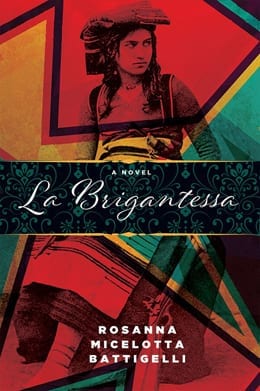
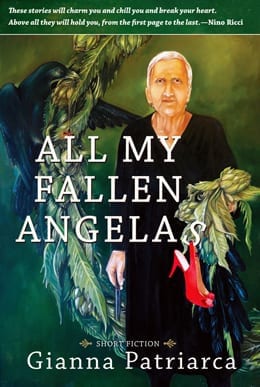
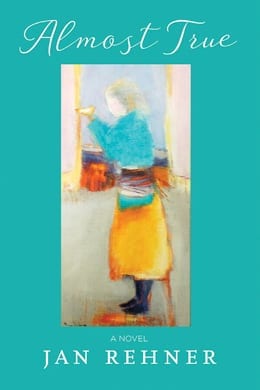
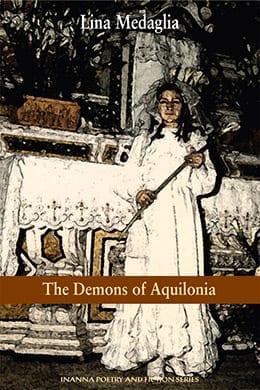

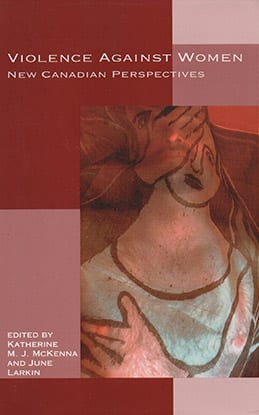

Mirella Sichirollo Patzer –
La Brigantessa by Rosanna Micelotta Battigelli
reviewed by Mirella Sichirollo Patzer
Ottawa Review of Books – January 2, 2019
https://www.ottawareviewofbooks.com/single-post/2019/01/02/La-Brigantessa-by-Rosanna-Micelotta-Battigelli
La Brigantessa is a fascinating novel that sweeps the reader into one of the most unsettled historical decades of Italian History – the Unification of Italy, which took place between 1860 to 1870. What impressed me most about this novel was how factual history was seamlessly interwoven with a handful of fictional characters and how they were impacted during this tumultuous political period. This is what I expect from a good historical fiction novel – to be entertained as well as educated, and this novel did this brilliantly.
Each of the main characters was well drawn out; with intriguing backgrounds, unique adversities they face, and fascinating personalities. A common thread between them was the theme of poor vs rich and the prejudices that existed between those two classes. As I read, I truly felt their hunger, their desperation, their driving needs. The background, customs, and culture of southern Italy, namely Calabria, really came to life and I could visualize the foods, the surroundings, and those tiny details of everyday life.
Gabriella Falcone is the protagonist, a young peasant who lives with a loving father and younger brother. Together they take care of the parish priest, Don Simone. She is in love with a young man named Tonino who prepares to ask for her hand in marriage. But when the wealthy Alfonso Fantin arrives from the north to seize parish lands, he assaults Gabriella. The attack results in her stabbing Alfonso. To avoid persecution, Don Simone helps Gabriella and her younger brother flee to safety. This thrusts them into the path of danger and interaction with the brigands / rebels of the time.
Part love story, part historical recounting, the author gives us an accurate glimpse of the turmoil of the time and how the people of Calabria suffered. Stories about the Italian unification are rare, so it was a real pleasure to read this novel. The author vividly brought to life the rich Calabrian culture and made me feel as if I was there. Completely engrossed in this tale, I read it in two sittings. I could not put it down. If you are like me, a fan of Italian historicals, then get this novel. Get it now! You will not be disappointed.
Renée Knapp –
La Brigantessa by Rosanna Micelotta Battigelli
Un po’ di pepe – January 7, 2019
https://unpodipepe.ca/2019/01/07/la-brigantessa/
La Brigantessa is a novel of historical fiction which takes place following the Unification of Italy (1860’s), during a decade of turmoil. It was a time when law enforcement was often worse than the criminals and the law only protected the wealthy.
The main character, Gabriella Falcone, is a young peasant girl whose family work for the parish priest in a small village in Calabria. Her inamorato, Tonino has volunteered to fight alongside Giuseppe Garibaldi. When Gabriella stabs a nobleman in self defense, she is forced to flee with the priest, knowing that her version of what happened will not be believed. La Brigantessa has everything a great read needs…love, honour, class struggles, jealousy, betrayal, bravery, suspense, and even a ‘modern’ Calabrese Robin Hood.
The story is told from the point of view of many characters, yet they are all so well-developed there is no confusion. Each character is given a detailed, credible backstory, revealing their individual struggles and motivations. I was emotionally invested in these characters, even the nasty ones! The attention to detail regarding life and customs in 19th Century Calabria transported me there.
I have been waiting 2 years for this book to come out, since I listened to the author read excerpts from it at 2 conferences-and it did not disappoint. This is not one of those book reviews that gives away the whole book, so that is all I am going to say! Pour yourself a glass of vino-red, of course, sit back and enjoy. I can’t wait for the sequel and/or movie.
I give La Brigantessa 5 peperoncini out of 5 !
Renée Knapp –
La Brigantessa by Rosanna Micelotta Battigelli
The Miramichi Reader – May 18, 2019
https://miramichireader.ca/2019/05/brigantessa-review/
Rosanna Micelotta Battigelli’s ambitious debut novel, La Brigantessa has already garnered awards and nominations, such as the Winner of the IPPY Gold Medal for Historical Fiction and Finalist for the 2019 Fred Kerner Book Award. No doubt more recognition will come (best cover art?) for her and La Brigantessa. Update: La Brigantessa‘s cover did win an award! See: https://miramichireader.ca/2019/09/2019-very-best-book-awards/
The historical background of this engrossing book is General Garibaldi’s campaign against Rome that led to his wounding and imprisonment after being defeated in the Calabrian mountains of the Aspromonte in 1862. The small peasant village of Camini is where we find our heroine, Gabriella Falcone and her admirer, Tonino. The church lands have just been acquired by a wealthy landowner from the north, Alfonso Fantin, a lecherous and immoral man into whose hands the future of the peasants now lies. Upon arriving in Camini to inspect his latest purchase, he is immediately attracted to Gabriella and has set his eyes on her with bad intent. What transpires next is getting into spoiler territory, but it results in Gabriella and the priest Don Simone fleeing Camini and soon falling into the band of brigands headed by Stefano Galante. Stefano, like all the brigands in the Aspromonte, all have a reason for evading the law, and Stefano is no different. The question remains: what will he do with the two captured villagers, one a priest, the other a beautiful peasant girl? Will Gabriella become a brigantessa to stay alive? Will she ever see Tonino again, who has joined Garibaldi’s “red shirt” army?
La Brigantessa is a novel that fans of the historical fiction genre will definitely enjoy. It contains adventure, suspense, murder, and battle scenes that fill the 300 + pages of this book. However, I found, at times, the details detracted from the story and I glossed over them to get to the next scene. Some things have to be left to the reader’s imagination! The true strengths of this book lie in the descriptions of Italian peasant life at the time and the wilderness of the Calabrian mountains, where bands of brigands lied in wait to pillage and plunder from wealthy travellers along the rugged paths and trails of the Aspromonte.
I was conflicted as to what to rate this book at Goodreads. I would easily give it four stars for the historical side of the tale, but three stars for what I believe is a too-protracted narrative. Thus, I settled on a “solid” three stars. I do hope that there may be a sequel; for the ending leaves the way open for one. ‘Nuff said! I am adding La Brigantessa to the 2019 longlist in the First Book category for a “The Very Best!” Book Award. Bravo, Signora Battigelli!
Renée Knapp –
La Brigantessa by Rosanna Micelotta Battigelli
reviewed by Fiona Alison
Historical Novel Society HNR Issue 89 – August 2019
https://historicalnovelsociety.org/reviews/la-brigantessa/
Excerpt:
In the aftermath of the Unification of Italy, two narrative streams intersect in the rugged beauty of the Calabrian mountains. Gabriella, a poor working farm girl, is raped by a wealthy landowner and stabs him as she attempts to escape. Stefano is hiding out with his brigand band, after avenging the brutal rape of his sister. Gabriella’s rapist comes after her. The head of Operations of Repression is hunting Stefano. Gabriella and Stefano are now both on the wrong side of the law. Both have to flee their homes and families. Both face a cruel kind of justice if caught. When Gabriella and her priest protector are accosted by the outlaw band, Stefano, a conflicted ‘Robin Hood’ known as the ‘gentleman’ brigand, vows to protect them.
This is an impeccably researched novel, borne out by the extensive bibliography of English and Italian sources, and the author’s love of her motherland is evident…
…Thought-provoking, with ageless topics of human frailty and human cruelty.
Renée Knapp –
La Brigantessa by Rosanna Micelotta Battigelli
reviewed by Maria Pia Spadafora, Writer and Translator in Milan
MA in Modern Languages & Literature, University of Calabria – March 2020
“Sole alla valle, sole alla collina
Per le campagne non c’è più nessuno
Addio, addio amore, io vado via
Amara terra mia, amara e bella.”
– Amara terra mia, Domenico Modugno
Rosanna Micelotta Battigelli’s La Brigantessa (Inanna Publications, 2019) perfectly evokes the feeling of nostalgia and bitterness expressed by Modugno’s song for leaving the motherland. Her nostalgic attitude towards Calabria eloquently captures the painful separation many people experienced.
La Brigantessa is a thoughtful, intricate and fascinating historical novel based on the turbulent periods between 1860 and 1870 in Calabria. The story focuses on the main character of a peasant girl, Gabriella Falcone, who is forced to leave her tiny hamlet after stabbing a northern landowner who tried to rape her. The peasant girl, with the assistance of the parish priest for whom she works and care for, finds herself entangled in between the outlaw world of the brigandage where good and evil come together and interact.
The novel pays homage to Calabria, showing the dichotomy between light and the shadow that had characterized and still characterizes the territory in a different way. The tone of the novel is nostalgic. This nostalgia comes from the simplistic reality of the peasant life, of the varying colours and diverse flavors which Calabria offers. At the same time this beauty and richness clashes with poverty, violence and above all injustices suffered by the agrarian population in the south of Italy and the consequences which arise from their desperation. The opening scene, besides vividly describing one of the most characteristic peasant traditions–the annual slaughtering of the hog– foreshadows the ominous scenes of violence to come. Moreover, the traditional butchering of the hog is not only described as a mere act but as a communal celebration amongst family and fellow villagers. This scene also connected death and life celebrated and highlighted at the same moment by Gabriella who associates the sight of the blood of the animal to the birth of her brother, Luciano. These themes merge together from the very start and develop gradually throughout the narration.
La Brigantessa allows us to reflect on the deeply rooted and persistent cultural, social, and economic differences between the north and the south of Italy. Under the eye of the north, Calabria is described mainly in the novel as “land of darkness and despair (p.28)”, “the land of pestilence (p.52)” and Calabrians “as a barbaric, uncivilized people living in a state of abject poverty and illness(p.29).”
The novel depicts various portraits of differing female roles from a woman as mother, as daughter to be protected, as a brigantessa, as wife and in Liliana’s case, as lover. Each of these women, while appearing to be characterized as weak, and sometimes submissive figures, are actually strong and in the most critical moments show unrelenting personal strength and self-confidence as Gabriel-la realizes: “All her life she has thought about others. Done for others. […] Kept house, tended animals and garden, cooked, washed. […] But now she can’t think about them anymore. She must think about herself (p.339).”
Motherhood is represented in the novel in a different way. Gabriella who, after her mother’s death, adopts the role of foster mother for Luciano while also taking care of her father and don Simone, the parish priest. Many mothers of brigands provided their sons whatever they needed to survive in the forest such as sewing special pockets within their vests to enable them to carry concealed daggers and pistols with them at all times.
Another element that reflects the Calabrian culture in La Brigantessa is the well-established and significant use of superstition. For instance, the hen singing stridently foreshadows that something bad is going to happen. Or the figure of the old midwife Nicolina, a sort of fortuneteller and healer, and a typical figure presented in each Calabrian hamlet who cured with herbs and removed the evil eye.
Calabria is also presented as a land ravished by earthquakes, revealing the territorial nature of an area with high seismic activity resulting in disastrous episodes during its history. From this point of view the novel highlights the trauma and fear of the inhabitants who experienced the destructive force of the earthquake themselves.
The religious element in the novel emphasizes the great faith that has linked and bound Italy but more so the south. There are numerous displays of penance, pilgrimages and religious vows which take place every year in different Calabrian hamlets. There is a strong religious consciousness and devotion that the author emphasizes even among the brigands themselves.
Food is central in many ways, not only as a symbol of sharing when they gather at the banquet after the slaughter of the hog, but it is also one of legacy and a sign of hospitality. Moreover, Battigelli honors the typical Calabrian products that are a source of pride and tradition: from ber-gamot to soppressata. That La Brigantessa is a well-researched novel there is no doubt, not only historically speaking but it also shows a great attention to details that sometimes may go unnoticed. For instance, the indirect mention of Lambroso’s studies on a brigand’s skull, aimed at showing a connection between a brain abnormality and the violence of an outlaw. Also in the novel general Russo sends the skull of a brigand to a forensic scientist to analyze it.
From a stylistic point of view the novel has a compelling rhythm. The simplistic narrative structure with initially several separated stories inevitably end up intertwining together in a linear way. The realistic dialogues allow the readers to feel they are part of the story. It arouses the reader’s curiosity through the witty use of flashbacks to bridge some of the gaps in the story. Interesting is the use of the Calabrian dialect which appears above all in reference to the food and utensils of the rural environment. Different is the case of the folk song of the Calabrisella which is translated into English, highlighting the double identity of the author who moves between two lan-guages and two cultures.
Eventually, La Brigantessa shows that another side to brigandage. The brigand is not only the person who commits evil deeds but a person who is in a gray area, where good and evil sometimes have no clear boundaries but move close to the edges like a tale from Robin Hood.
I would highly recommend La Brigantessa to anyone who wants to take a sentimental journey throughout the Calabrian world of the Nineteenth century and to lose themselves in the magical Aspromonte forest which, implicit in its name, can offer greatness but also bitterness.